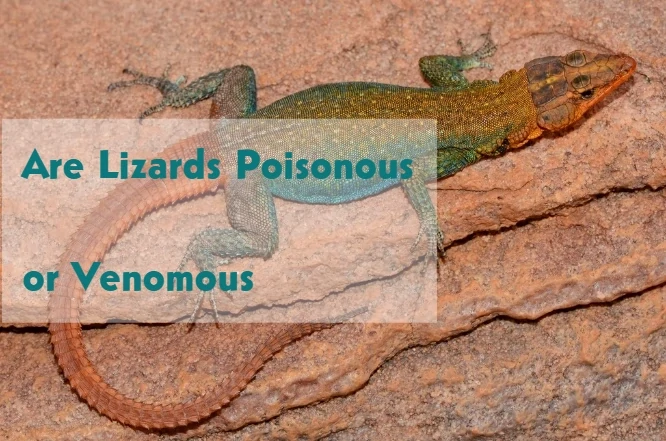If you’ve ever seen a lizard dart across your yard or climb up a wall, you probably had that little pause. They’re quick, scaly, and sometimes stare back at you like they’re up to something. You might wonder, “Wait… are these things poisonous? Could they hurt me or my pets?”
That’s a fair question. We grow up hearing about dangerous reptiles, from venomous snakes to deadly Komodo dragons. But what about the lizards you see around your home?
No, lizards generally aren’t poisonous or venomous and aren’t harmful to people, dogs, or cats. The majority are harmless insect-eaters that just want to stay out of your way. Only two lizard species in North America are venomous: the Gila monster and the Mexican beaded lizard. And you’re unlikely to ever see those unless you live in certain desert areas.
For most of us, the lizards we see every day (like house geckos, anoles, or skinks) don’t have toxin, and they don’t pose any real danger to people or pets.
What’s the Difference Between Poisonous and Venomous?
Before we talk more about Lizards, it’s important to know what the words poisonous and venomous actually mean.
The difference comes down to how the toxin gets into your body. It’s pretty simple once you understand the pattern.
- If an animal has to bite, sting, or inject you to deliver its toxins, it’s venomous. Think of snakes with fangs, scorpions with stingers, or spiders with fangs. They actively put their toxins into you.
- If an animal secretes toxins on its skin or in its body, and you have to touch, eat, or absorb those toxins to be harmed, it’s poisonous. Think of poison dart frogs with toxic skin or certain plants that make you sick if you eat them.
Here’s an easy way to remember it: if you bite it and you get sick, it’s poisonous. If it bites you and you get sick, it’s venomous.
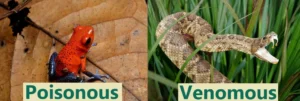
Most people mix up these words, but knowing the difference helps you understand how to stay safe around animals.
A venomous animal is dangerous when it bites you, while a poisonous animal is dangerous when you touch or eat it.
What Makes People Think Lizards Are Poisonous?
It’s easy to see why lizards get a bad reputation. They move fast, they’ve got scales, and they can even drop their tails when threatened.
To someone who doesn’t know much about them, that can seem a little creepy.
Plus, the word “reptile” makes people think of snakes, crocodiles, or other scary animals. So lizards sometimes get lumped in with the dangerous ones.
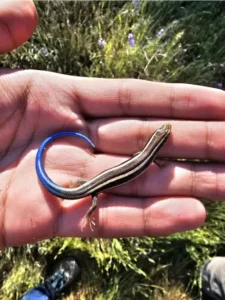
But the truth is, most lizards are shy and gentle. They avoid conflict. They don’t want to bite, attack, or poison anything unless they have to.
And even then, their “attack” is usually just running away.
Which Lizards Are Actually Venomous?
Only a handful of lizard species in the world are actually venomous. In North America, there are just two: the Gila monster and the Mexican beaded lizard.
The Gila monster lives in the southwestern United States, mainly in Arizona, parts of California, Nevada, Utah, and New Mexico.
It’s a large, slow-moving lizard with distinctive beaded skin covered in black and pink or orange patterns.
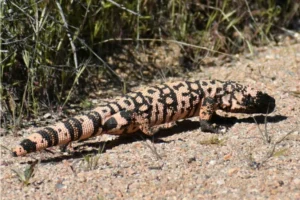
The Mexican beaded lizard is closely related to the Gila monster and lives in Mexico and small parts of Guatemala. It looks similar but is usually darker in color, with yellow and black patterns.
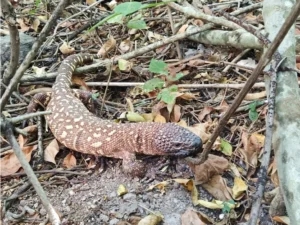
Both of these lizards have venom glands in their lower jaw. When they bite, they don’t inject venom like a snake does with fangs.
Instead, they chew on their victim, and the venom flows from their lower jaw into the wound through grooves in their teeth.
The venom these lizards produce contains several toxic compounds that cause intense pain, swelling, and can affect blood pressure and blood clotting.
However, deaths from Gila monster or Mexican beaded lizard bites are extremely rare.
Monitor lizards, which live in Africa, Asia, and Australia, also produce venom. These lizards can grow quite large (some species reach over 10 feet long), and their bites can be dangerous.
However, most monitor lizard bites cause problems mainly from bacteria in their mouth rather than from venom.
Which Lizards Are Poisonous?
Very few lizards are truly poisonous. Unlike venomous lizards, which are well-documented, poisonous lizards are quite rare and not well-studied.
Some species of newts and salamanders (which are actually amphibians, not lizards, but people often confuse them) are highly poisonous.
They secrete toxins on their skin that can be deadly if ingested. However, these aren’t lizards.

There are reports that some skink species might be poisonous if eaten, but the evidence isn’t very strong.
In some cultures, certain lizards are believed to be poisonous, but scientific studies haven’t confirmed this in most cases.
The reality is that most lizards don’t produce toxins at all. They rely on other defense methods like speed, camouflage, dropping their tails, or just hiding to avoid predators.
Even lizards that might have mild toxins don’t pose any real danger to humans.
You’d have to deliberately eat the lizard or its skin secretions to have any problems, and even then, the effects would likely be mild.
What About the Lizards Around Homes?
The lizards you’re most likely to see around your home are completely harmless.
This includes species like the common house gecko (Hemidactylus frenatus), or outdoor types like anoles, skinks, or fence lizards,
House geckos are tiny lizards that often come indoors looking for insects. They’re not venomous, not poisonous, and actually quite beneficial because they eat bugs.
Some people even encourage geckos to live in their homes for natural pest control.
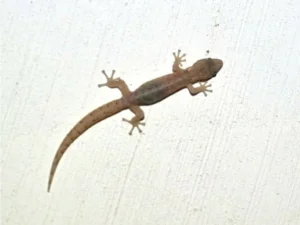
Green and brown anoles are common in the southern United States. These small lizards can change color slightly (though not as dramatically as chameleons), and they’re completely harmless to humans.
Fence lizards (also called spiny lizards) are common in many parts of North America. They have rough, spiny scales that might look dangerous, but they can’t hurt you. They might try to bite if you pick them up, but their bite is weak and doesn’t break skin.
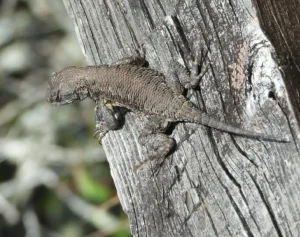
Blue-tailed skinks are another common species. Young skinks have bright blue tails that they can drop if a predator grabs them. There are old myths that these lizards are poisonous, but this isn’t true. They’re completely harmless.
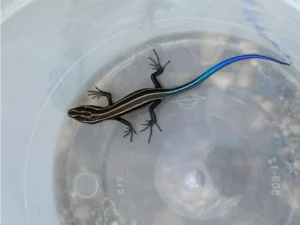
The worst thing that might happen if you pick up one of these lizards is a small bite (which rarely breaks skin) or they might poop on you as a defense mechanism. Neither is dangerous, just unpleasant.
Can Lizards Harm Dogs or Cats?
This is a common worry if you have pets. You see your dog sniffing the garden or your cat stalking something near the wall, and it turns out to be a lizard.
Most of the time, no harm comes from that. Dogs and cats might chase, play with, or even eat a small lizard, but the majority of house or garden lizards aren’t poisonous or venomous.
There are a few small things to keep in mind:
-
Some lizards can carry salmonella bacteria, like other reptiles can. If your pet eats one, they might get a mild stomach upset.
-
In rare cases, larger lizards like monitor lizards (in parts of Africa, Asia, or Australia) can bite hard and cause infection, but those aren’t the kind you’ll see in your backyard.
So if your pet eats a small gecko or anole, it’s usually fine. Just watch them for a day or two. If they act sick or vomit repeatedly, call your vet.
What About the Big Lizards Like Monitors or Iguanas?
These can look scarier because they’re bigger and stronger, but even they’re not venomous.
Iguanas, for example, can whip their tails when they feel threatened, and big males can deliver a painful bite if cornered. But they don’t have venom or poison.
They’re plant-eaters and mostly just want to bask in the sun.
Monitor lizards eat meat and can be more aggressive if they feel trapped. A large monitor can bite hard and may carry bacteria that could cause infection.
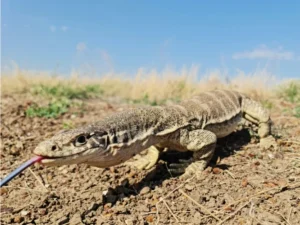
Still, even they aren’t venomous. Some species have mild proteins that mostly affect prey, not people.
So while they’re not poisonous, you don’t want to provoke one either.
What About Pets That Try to Eat Lizards?
If your cat or dog likes to hunt, you might see them bringing lizards as “gifts.” Gross, but normal.
Usually, it’s harmless. Small lizards don’t have toxins that can hurt pets. The only risks are:
-
Bacteria like salmonella
-
Parasites if your pet eats them often
-
Choking if the lizard is big and swallowed whole
To be safe, try to stop pets from eating wild lizards. Not because it’s dangerous, but because it’s better for hygiene, like you wouldn’t want your dog snacking on bugs.
Why Lizards Are Good to Have Around
Lizards might look a little strange, but they’re a good sign of a healthy environment. If you see them around your home, it usually means there are plenty of insects, and the ecosystem is balanced.
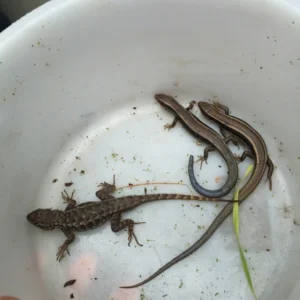
They help control pests naturally. A single house gecko can eat dozens of mosquitoes and flies in one night. Garden lizards protect plants from grasshoppers and beetles.
And unlike rodents or roaches, they don’t carry diseases or chew on your stuff. They’re quiet roommates that just happen to have scales.
How to Keep the Peace With Lizards Around Your Home
If you’re uneasy, that’s fine. You don’t have to get rid of them, just learn to live with them.
Here are some easy ways to coexist:
-
Keep food sealed and kitchens clean so they don’t chase bugs indoors.
-
Close small gaps and cracks around windows or doors.
-
Use screens on windows and vents.
-
Turn off outdoor lights when you don’t need them, they attract insects, which attract lizards.
Basically, if you control the bugs, the lizards will move on naturally.
But honestly, having a few lizards around isn’t bad. Think of them as your free pest control team working the night shift.
How Can You Identify Venomous Lizards?
Gila monsters are pretty distinctive and easy to identify. They’re large (up to 2 feet long), heavy-bodied lizards with beaded, bumpy skin. Their coloration is striking, with patterns of pink, orange, or yellow on a black background.
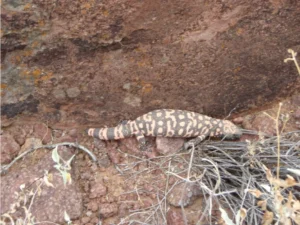
They move slowly and deliberately. If you see a lizard that looks like it’s made of colorful beads and moves like it’s in slow motion, it’s probably a Gila monster.
Mexican beaded lizards look similar but are usually darker. They have black and yellow patterns instead of the pink and orange you see on Gila monsters. They’re also slightly longer but less bulky.
Both species have thick tails where they store fat. They have short, sturdy legs and a large head with powerful jaws. Their eyes are small and bead-like.
If you live in the southwestern United States or Mexico and see a lizard matching this description, give it plenty of space. Don’t try to catch it, move it, or get close to it.
Monitor lizards are much larger and have a different body shape. They’re long and snake-like with powerful tails.
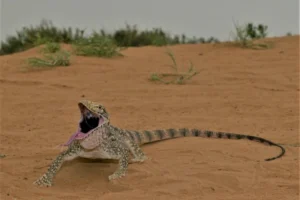
Most monitor species have forked tongues like snakes. If you see a very large lizard (several feet long) with a forked tongue, it’s probably a monitor lizard.
Conclusion
So, are lizards poisonous or venomous? No, almost all lizards are completely harmless.
The small ones you see around your home or garden aren’t venomous, don’t bite unless cornered, and are actually good for pest control.
Only two species (the Gila monster and the Mexican beaded lizard) have venom, and you probably won’t come across those unless you live in their desert habitats.
For your pets, lizards aren’t poisonous either. At most, they might cause a mild stomach upset if eaten, and that’s it.
In the end, lizards are one of nature’s quiet helpers. They keep bugs away, don’t destroy property, and rarely cause trouble.
So the next time you see one darting up a wall or hiding under a light, just let it be. It’s not dangerous, it’s just doing its job.
Hi, my name is Ezra Mushala, i have been interested animals all my life. I am the main author and editor here at snakeinformer.com.

